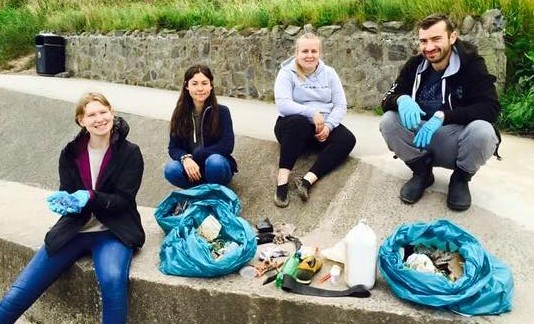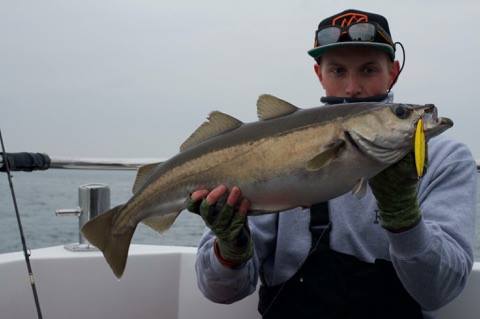News
The ocean is suffering – here’s how you can help

The oceans are suffering. Around 8 million items of litter enter the marine environment every day; plastic is now the most common element found in the ocean. One hundred thousand sea mammals are killed in the ocean by pollution each year, and another three hundred thousand dolphins and porpoises die each year because of becoming entangled in ghost fishing gear.
Stopping pollution and removing pollution from the ocean is a momentous task. But everything begins with small steps; some can be done from the comfort of your own home, and some can be integrated into the classic bank holiday trip to the seaside.
Some ocean friendly choices are:
Use bags for life instead of normal plastic bags
A plastic bag can take between 150 years to over 1,000 years before it degrades. However, it doesn’t biodegrade, it’s broken down by light into tiny little fragments of plastic, which are toxic – these are known as microplastics. In relation to the ocean, an estimated 1,000,000 birds, 100,000 turtles, and countless other sea organisms die each year from ingesting plastic, according to Greenpeace. They can easily mistake plastic bags for jellyfish and other edible sea creatures. Using a reusable carrier bag prevents more plastic entering our oceans.
Join a beach clean
Bank holidays are always an excuse to visit the seaside – have some chips sat on the pier, watch the kids fight over who has built the best sandcastle… or you could join one of the many groups of people who spend their weekends/bank holidays cleaning the beaches. They collect washed up cans, plastic bottles, toys… all sorts of things! There are events organised all over the UK for people to take part in (here, here, here). Or you could organise you own! Maybe have an impromptu tidy up, making it a game for the children. To see some of the amazing things which have been found on beach cleans look here.
Recycle
Recycling 14 trees worth of paper reduces air pollutants by 165,142 tons. I know we’re discussing marine pollution, but ocean acidification is caused by the uptake of CO2 from the air, and recycling could potentially slow the rate of coral bleaching and save calcified organisms, which are damaged by increasing ocean acidity.
The dumping of used plastic destroys sea life at an estimated 1,000,000 sea creatures per year! Glass and plastic take the longest to degrade, but are completely recyclable, which is why it’s important we recycle them. It’s believed that 60%-70% of rubbish we put in our bins could have been recycled instead. Recycling doesn’t just reduce the amount of waste entering the ocean, it also reduces the amount of power we use. Theoretically, we could hit two birds with one stone. When we produce aluminium products from virgin metal it consumes close to 100 times the power required to recycle aluminium. In the UK an estimated 70% of our energy comes from non-renewable energy sources. If we use less energy we will lower the amount of air pollution, which I’ve already mentioned has horrific effects for our oceans.
Food scraps to compost
In 2009 it was found that an estimated 25% of food bought by households was thrown away. Food waste contains Nitrogen and Phosphorous which when in water can lead to eutrophication and algae blooms.
By collecting your food waste and using it to produce compost you are reducing your rubbish – and that compost can be used instead of artificial fertilizers.
Compost is great for the environment and great for you. It’s free to make and replaces somewhat expensive fertilizer and shop bought compost.
To find out how to set up your own compost look at my previous article here.
Purchase items with minimum packaging
When you go into a supermarket, it’s likely you will see more packaging that you will food. I know I do! Apples surrounded in Styrofoam holders swarming with plastic wrapping, bread suffocating in plastic bags…
To reduce your waste and plastic usage try and purchase items which come with less packaging, or at least recyclable packaging. Most plastic can be recycled, but make sure you read the packaging, and look for the recyclable symbol. Styrofoam is not recyclable and can take over 500 years before it typically begins to break down. In the ocean, Styrofoam is often mistaken for food and eaten; when inside an organism, it blocks the digestive tract and the organism will usually starve and then die.
Read the label
I will admit I am terrible for looking at labels when I’m shopping, but I try and check for the basics: sustainable fishing (the blue tick – if you want more information about how to shop for fish sustainably there is information here). I also avoid microbead products. Although they are now being phased out (UK and USA), it will still take years before they are completely gone from our shelves. A new one I will be adding to my list is cleaning products which contain phosphate which can lead to eutrophication (excessive richness of nutrients) and algal blooms (rapid growth of algae, which can cause oxygen reduction). A small change in your shopping habits can make a big difference to the ocean; for example, allowing fish stocks to increase.

Sustainably caught Pollack. Credit John Wheeler
On a positive note, we are making a difference – we are increasing the amount of power we receive from renewable sources; we are also reducing the amount of plastic we use. We’re moving forwards to a brighter future – one with a healthier ocean.
I hope these tips have given you a few ideas to help you lead a greener life, and to know that no matter how far away from the coast you are, you matter to it.
Gear News
Introducing the TR-80, IR-50 and CS-30 Regulators from DYNAMICNORD

Whether you are a beginner or a professional diver – with the three new main regulators from DYNAMICNORD, everyone will find their favourite regulator. They all look super stylish.
Excellent performance with the TR-80
Quality and performance are the be-all and end-all for regulators. It is not for nothing that the TR stands for Tec Reg. The innovative design of the TR-80 guarantees absolute reliability – even in ice-cold waters.

Perfect breathing effort at 0.8 J/l / certified for diving in waters below 10 degrees / structural design made of solid brass for best cold protection / membrane-compensated design with dry seal of the first stage / reduced exhalation effort thanks to optimized exhalation membrane and bubble deflector / adjustable Venturi (dive/predive) and adjustment knob for individual inhalation comfort / innovative design of the front cover prevents free-flow in strong currents or when diving with scooters / design made of sandblasted brass, matt chrome finish / 2 HP and 4 LP outlets / mouthpiece made of high-quality, anti-allergic silicone for maximum comfort.


Amazing underwater adventures with the IR-50
The IR-50 is the top regulator for advanced and experienced divers. Natural breathing is the essence of this regulator.

Ideal breathing effort at 0.8 J/l /certified for diving in waters below 10 degrees / compensated membrane / adjustable venturi (dive/predive) and adjustment knob for individual inhalation comfort/ outlet valve and deflector for minimum exhalation effort and reduction of bubbles on the face / design made of sandblasted brass, matt chrome finish / 2 HP and 4 NP outlets / mouthpiece made of high-quality, anti-allergic silicone for maximum comfort.


The Workhorse – our CS-30
For diving centres and diving beginners – the workhorse stands for strong construction, reliability and robustness. Perfect for your training.

Optimal breathing effort at 0.8 J/l /recommended for diving in waters above 10 degrees / non-compensated piston / adjustable venturi (dive/predive) / outlet valve and deflector for minimum exhalation effort and reduction of bubbles on the face / design made of sandblasted brass, matt chrome finish / 1 HP and 3 NP outlets / mouthpiece made of high-quality, anti-allergic silicone for maximum comfort.


Octopus OP-30
The OP-30 is the ideal addition to all DYNAMICNORD regulators. It is identical in construction to the CS-30.

The TR-80, IR-50, CS-30 (DIN & INT) regulators and the Octopus OP-30 are available from DYNAMICNORD dealers and in the online store.
DYNAMICNORD – Your Outdoor Companion.
Marine Life & Conservation
Paul Watson Released as Denmark Blocks Japan’s Extradition Bid

Renowned anti-whaling activist Paul Watson has been released from custody in Greenland after spending five months in detention. Denmark’s Justice Ministry rejected Japan’s request for his extradition, citing insufficient guarantees that his time already served in custody would be credited against any potential sentence.
The 74-year-old Canadian-American was arrested on July 21 in Nuuk, Greenland’s capital, when his ship docked to refuel. His arrest was based on a 2012 Japanese warrant related to a 2010 encounter in Antarctic waters. Japan alleged Watson obstructed operations and caused damage to a whaling research ship during efforts to disrupt illegal whaling. Watson has consistently denied these claims, maintaining his commitment to marine conservation.
Denmark, which oversees extradition matters for Greenland, concluded that while the legal conditions for extradition were met, the lack of assurances from Japan regarding time-served credit made extradition untenable.
In a video shared by his foundation, Watson expressed gratitude and relief, saying, “After five months, it’s good to be out… and good to know they’re not sending me to Japan.” He added that the most difficult part of his time in custody was being separated from his two young sons.
Watson is a pioneering figure in marine conservation, known for founding the Captain Paul Watson Foundation in 2022 after decades of activism with the Sea Shepherd Conservation Society. His bold efforts to defend marine life have earned him widespread support, including from celebrities and conservationists. His work has also been featured in the acclaimed reality TV series Whale Wars.
Watson’s lawyer, Jonas Christoffersen, praised the decision, stating, “We are happy and relieved that Paul Watson is now free.” He added that Watson is eager to reunite with his family and continue his vital work.
The arrest occurred while Watson’s vessel, the M/Y John Paul DeJoria, was en route to the North Pacific with a team of 26 volunteers to intercept a Japanese whaling ship. His foundation described the arrest as politically motivated and emphasized that Watson’s actions were focused on ending illegal whaling practices.
Japan resumed commercial whaling in 2019 after leaving the International Whaling Commission, asserting that whale meat is a cultural tradition. Conservationists, however, continue to challenge these practices, highlighting their impact on marine ecosystems.
Despite the challenges, Watson remains steadfast in his mission to protect marine life and bring attention to whaling practices. His dedication to ocean conservation has made him a globally respected advocate for the environment.
-

 News2 months ago
News2 months agoIconic SS United States to become the World’s Largest Artificial Reef
-

 News3 months ago
News3 months agoBook Review – 52 Assignments: Underwater Photography
-

 Gear News3 months ago
Gear News3 months agoDYNAMICNORD – New German diving brand enters the British market
-

 News3 months ago
News3 months agoExploring Cenote El Pit: A Diver’s Dream
-

 Gear News3 months ago
Gear News3 months agoTry BARE drysuits (and maybe even win one!) this Friday with Sea & Sea at North West Dive Fest
-

 Marine Life & Conservation3 months ago
Marine Life & Conservation3 months agoBook Review: Coral Triangle Cameos
-

 Blogs2 months ago
Blogs2 months agoDive the Egyptian Red Sea this Autumn with Regaldive
-

 News3 months ago
News3 months ago2024 Ocean Art Underwater Photo Competition Announced















